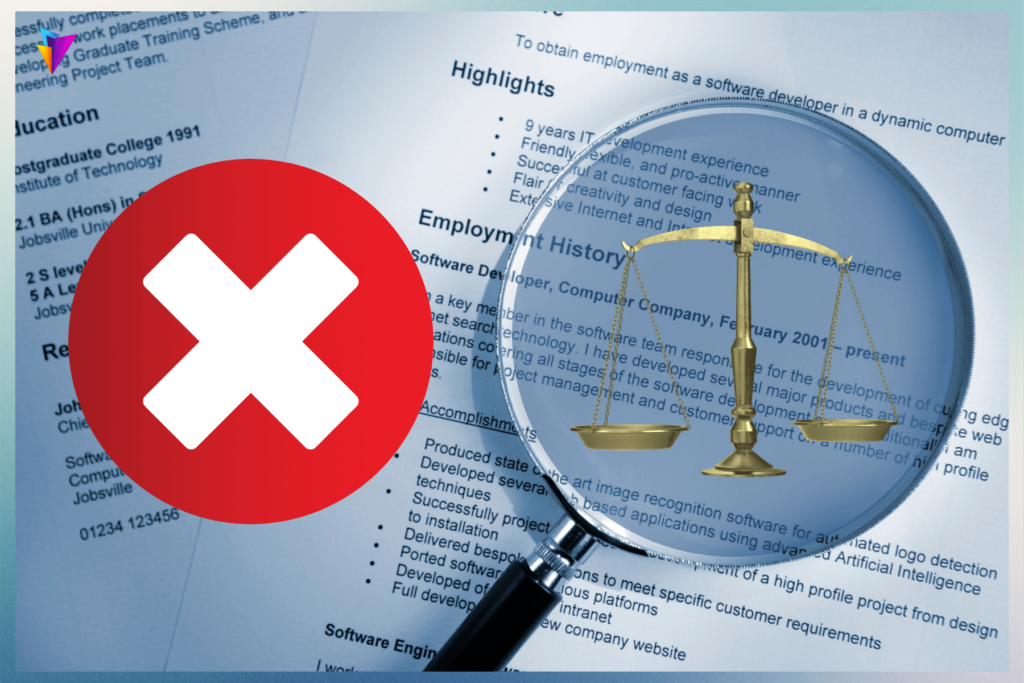When job hunting, your resume is your first impression to potential employers. Yet, many job seekers make simple mistakes that can ruin their chances of an interview. This blog highlights the most common resume mistakes and how to avoid them, ensuring you present yourself in the best possible light and improve your chances of success. So Let’s begin!
Common Formatting Errors and How to Fix Them
One of the biggest hurdles in modern job applications is ensuring your resume is formatted correctly, not just for human recruiters but also for Applicant Tracking Systems (ATS). It’s crucial to create a balance between form and function to increase your chances of an interview and job role. Being aware of and prepared for this is key to your success.
Overcomplicated Designs that Fail ATS Tests
While visually creative resumes might catch the eye of a human recruiter, they can often fail to pass an ATS check. Many job seekers mistakenly believe a flashy design will help them stand out. Still, intricate designs, graphics, and non-standard fonts can confuse the ATS, causing your resume to be discarded before it even reaches a hiring manager’s desk.
Here is how to Fix It:
- Stick to a simple, clean design with clear sections and standard fonts like Arial or Times New Roman.
- Avoid using tables, graphics, or columns, as these elements often don’t parse well in ATS.
- Prioritize readability and function over flashy aesthetics to ensure your resume passes through ATS and recruiters.
Ignoring Grammar and Spell Check
What happens when a resume is filled with grammatical errors and spelling mistakes?
Well, it sends the wrong message to employers. Even minor typos can make you seem careless or inattentive, which could cost you the job. In a competitive job market, hiring managers are looking for reasons to filter out candidates, and a poorly written resume gives them an easy reason to do so.
Here is how to Fix It:
- Always run your resume through spellcheck and grammar tools like Grammarly.
- You can ask an acquaintance, friend, or mentor to proofread your resume. Different people have different perspectives on reading and understanding, so their eyes can often catch minor or significant errors you might not have noticed while creating a resume.
- Pay special attention to details like consistency in tense and punctuation.
Content Pitfalls That Hurt Your Resume’s Effectiveness
The content of your resume is where you get to shine. However, many job seekers fall into traps by including irrelevant information or using ineffective language. Let’s look at how to avoid these mistakes and make your resume more powerful.
Including Irrelevant Information
It can be tempting to include every job or experience you’ve ever had, thinking that more information equals more chances to impress. However, hiring managers don’t want to sift through unrelated or outdated experiences. Including irrelevant details can distract from your core qualifications.
Here is how to Fix It:
- Tailor your resume to the job you’re applying for. Furthermore, it would be best to focus on relevant experiences that line up with the job description.
- Avoid mentioning personal details like age, hobbies, or marital status unless the job description asks for it or they directly relate to the position.
- Keep your resume concise and to the point, ideally at most two pages.
Using Passive Language Instead of Action Verbs
Another common mistake is using passive language when describing your accomplishments. Passive phrasing can make your achievements seem vague or less impactful. Instead, using strong action verbs gives a sense of initiative and results-oriented work.
For example:
- Instead of: “Was responsible for managing a team of five.”
- Use: “Managed a team of five employees, improving project efficiency by 20%.”
Here is how to Fix It:
- Go through your resume and replace passive phrases with powerful action verbs like “led,” “developed,” “increased,” and “implemented.”
- Be specific. Quantify your achievements with numbers to make them more impressive and easier to understand.
- Focus on results rather than responsibilities. This helps hiring managers see the tangible benefits you brought to your previous roles.
FAQs
What are the most common resume mistakes?
Common mistakes include:
- Using overly complex designs that fail ATS tests.
- Ignoring spelling and grammar errors, including irrelevant or outdated information.
- Using passive language instead of strong action verbs.
Can too much design on a resume hurt my chances?
Yes, too much design can confuse ATS, leading to your resume being rejected before it reaches a hiring manager. Stick to simple, ATS-friendly formats that balance design with functionality.
Should I include personal details like age or hobbies on my resume?
No, personal details like age, marital status, or hobbies are only necessary if they are directly relevant to the job. Instead, focus on professional qualifications and relevant experiences.
How can I avoid making spelling mistakes on my resume?
If you want to avoid grammatical or spelling mistakes, use a free or premium tool. You can also ask your mentor, a friend, or an acquaintance to proofread your resume to spot minor or major mistakes.
What kind of information should I leave off my resume?
Leave off irrelevant experiences, outdated skills, and personal details like age, marital status, or hobbies. Focus on information that aligns with the job you’re applying for.
How can I make my resume sound more active and engaging?
Use action verbs and focus on quantifiable achievements rather than passive phrases. Highlight how you made a difference in your previous roles using results-driven language.
Conclusion
Avoiding these common resume mistakes can significantly improve your chances of landing your dream job. By focusing on ATS-friendly formatting, eliminating grammar errors, and using robust and action-oriented language, you’ll create a resume that gets noticed by ATS and hiring managers. Remember, your resume is often your first impression—make sure it’s good.










